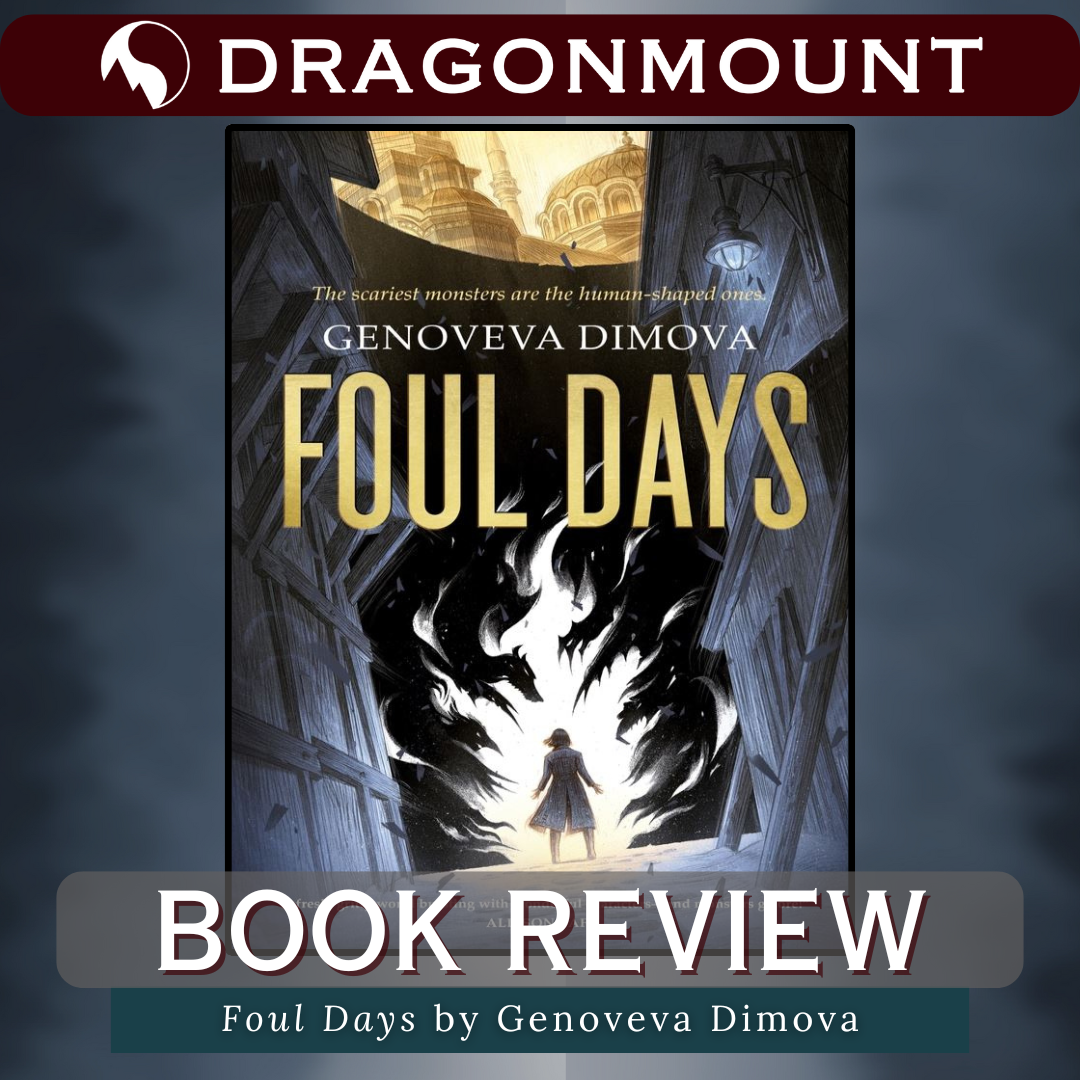
Many modern fantasy books are showcases of worldbuilding—magic systems, creative (and not so creative) variations on the “orc,” tongue-twisting character and place names, and so on. Foul Days by Genoveva Dimova has the best elements of all of that, but it also has what so many of its contemporaries do not: vivid and engaging prose. Take the very first paragraph.
It was nearly midnight on New Year’s Eve, but the city inside the Wall didn’t celebrate. The people there knew that the birth of a new year was—like any birth—difficult, painful, and dangerous.
You better believe I tore through this 350-page book in a hurry after that. It helped that I read it on vacation, of course, with my only distractions being ordering another drink and the occasional dip in the Pacific. But Foul Days isn’t just a great beach read. It is also a great stay-up-past-your-bedtime read, a great take-on-your-lunch-break read, a great anytime read. The action is fast, the world is vividly bleak, and the suspense kicks in early and doesn’t let up.
The main character, Kosara, is a young witch who has packed a surprisingly long troubled past into her short years. Before long, she is forced to give up her shadow—her magic—in order to escape from the Czar of Monsters. It’s a short-term solution, because a witch can’t live for long without her shadow. In Kosara’s quest to get it back, she gets swept up in the machinations of the criminal underworld and crooked cops—including a handsome cop with almost as many secrets as Kosara—and a host of monsters. There is an element of steampunk to the fantasy—trains, guns, and a hot air balloon make appearances—as well as a touch of romance (I did mention a handsome cop…).
I picked this book up because the blurb advertises The Witcher meets Naomi Novik, and doesn’t that sound like a good time? There is more Naomi Novik here than Geralt; the Witcher comparison stems mostly from the compendium of monsters and specialized monster fighters. Novik’s influence is much more present, with a flawed-but-strong young heroine and a world grown from eastern-European folklore roots. In the case of Foul Days, those influences come from the author’s origins in Bulgaria.
Indeed, the “Foul Days” of the title correspond to the Pagan Slavic winter holiday of Korochun, the time of year when the more malevolent spirits are at their most potent. Those spirits are especially potent in Chenograd, where the story begins. Chenograd and Belograd are two halves of a city divided by a wall—The Wall—which keeps all the monsters and evil spirits on the Chenogradean side. It also (mostly) keeps all the citizens of the cities on their respective sides. As you might imagine, there is some tension between the folks on opposite sides of The Wall.
We learn more about the origins of The Wall and how this city got to be divided as the book progresses. Dimova does an exceptionally good job of introducing the lore at a pace that keeps the reader informed without overwhelming. The POV is third person, but there is more than a hint of the unreliable narration from our heroine, Kosara, who has some secrets that she would rather not share with the reader or anyone else. This mostly works well, creating an atmosphere of uncertainty that very much matches the uncertainty that Kosara feels after crossing to the other side of the wall and discovering the betrayal and deception that more than validate her secrecy.
There are a few instances, though, where I wish Dimova had trusted her own very capable character development and left things in the subtext. For example, after Kosara meets a character who is revealed to have robbed a bank with a toy gun, we read that “Kosara glanced at Nur with newfound respect. This perhaps showed that something was amiss in Kosara’s own moral compass.” Added to the fact that on the very first page of the book we see Kosara using magic to cheat at cards, I don’t think we need to be told so explicitly in which direction her moral compass points.
Overwhelmingly, though, I enjoyed the prose of Foul Days immensely. The world that Dimova creates leaps off the page—sometimes frighteningly so—and, at times, managed to take me from my sunny vacation to the snowy streets of Chernograd and Belograd. I loved discovering and understanding the different monsters, some of which are truly evil and some of which are just your average creatures with their own needs and wants. The book also does an excellent job of illustrating that some of the humans are more monstrous than any creature, and, as the cover of the book says, “the scariest monsters are the human-shaped ones.”
Foul Days by Genoveva Dimova comes out in June, and I highly recommend putting it on your summer reading list. The second book, Monstrous Nights, is set to release in October, and I am already excited to see how Dimova continues this adventure. Thank you to TOR for the advance reader copy that I reviewed, and thank you to Grace for editing this review.












Recommended Comments
There are no comments to display.
Join the conversation
You can post now and register later. If you have an account, sign in now to post with your account.
Note: Your post will require moderator approval before it will be visible.